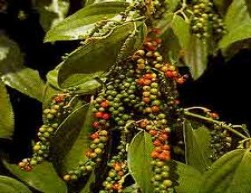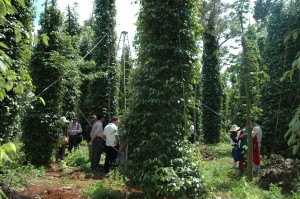 Some rumors that Vietnam will have a pepper season in the 2016/2017 crop year released at the end of 2016 are causing many foreign customers to “take advantage” to put pressure on pepper prices.
Some rumors that Vietnam will have a pepper season in the 2016/2017 crop year released at the end of 2016 are causing many foreign customers to “take advantage” to put pressure on pepper prices.
Along with that, in the country, some new pepper growers were bewildered by market movements, so there was a “sell-off” situation. These things are causing the price of pepper in the country to drop unusually deep.
Price drop due to… rumours
According to data from the Vietnam Pepper Association (VPA), domestic pepper prices began to trend down in 2016 when the pepper growing area showed signs of “hot” growth. In mid-March 2016, the price of black pepper dropped to only 130,000 VND/kg, then increased to 180,000 VND/kg in May.
However, from August to the end of the year, pepper prices always tended to decrease and showed signs of difficulty recovering like 2015. By early 2017, pepper prices were still at 128,000 – 135,000 VND/kg and only decreased. less than 100,000 VND/kg from April 2017.
Recorded from some purchasing agents and pepper traders, domestic pepper prices continued to decline sharply on May 18, ranging from 79,000 to 82,000 VND/kg, depending on the region. Compared to the same period in 2016, pepper prices have now decreased by 50%. This is considered a record decrease of the pepper industry in the past 5-6 years.
For a long time, Vietnamese farmers consider pepper as a kind of “currency”, they often keep it in storage and only sell it when needed. Many foreign experts have also said that Vietnamese pepper prices are unlikely to drop low, because pepper growers have had several years of accumulation, so they have conditions to temporarily store goods when prices are low and less pressured. This also explains the reason why even though the output increased recently, the market was still regulated with high selling prices.
However, at this time, pepper prices fell rapidly “dizzy”. Explaining this reason, Mr. Do Ha Nam, President of VPA, said that from the end of 2016, the world pepper business world identified that in the 2016-2017 crop year, Vietnam had the largest pepper season along with the output. higher. This has affected the psychology of buyers, leading to limited buying to force prices.
As for the domestic market, the Vietnamese pepper market has recently appeared a large amount of pepper originating from Cambodia, making the already abundant supply even more. In addition, new pepper growers at the end of the harvest often push to sell to cover initial investment costs. This created a “panic” mentality and scrambled to sell even though prices were falling.
Accounting for nearly 50% of global pepper production, Vietnam has many advantages to regulate the market. At this time, people need to calm down, they should not “sell out”, the pepper price will increase again; and need to take advantage of selling when pepper prices show signs of recovery. At the same time, in the current context, it is necessary to stop expanding the pepper growing area to avoid further oversupply,” said Mr. Nam.

The international delegation visited the pepper garden
Clean pepper production – the solution for sustainable development
In recent times, when the area and output of pepper has increased rapidly and the amount of exports is increasing, there have been some warnings from importing countries about the problem of chemical residues in Vietnamese pepper. exceed the limit allowed by the host country. Especially in the current context, when pepper prices are in a recession, quality issues are put first.
According to Mr. Do Huong Duong, Deputy General Director of Phu Nhuan Service Joint Stock Company (Maseco), although the quality of pepper still has some shortcomings, the reality is not to the level as mentioned by the media. .
Currently, the production cost of Vietnamese pepper is lower than that of other sources, so information related to “poor quality” and “chemical residue” will be diffused by competitors to “drain” Vietnamese pepper.
This is an unfair competition of foreign partners and this happens not only in the pepper industry but also in other agricultural products, especially seafood.
This is evidenced by the export turnover of pepper to markets which has continuously grown over the years. According to data from the Ministry of Agriculture and Rural Development, in the first 4 months of 2017, the whole country exported about 75,000 tons and 456 million USD, up 9% in volume.
Currently, Vietnamese pepper has been exported to over 105 countries. The largest pepper import markets of Vietnam in the first 3 months of 2017 were the United States, United Arab Emirates, Pakistan, India and Germany with 41% market share.
The markets with a sharp increase in pepper export value are Thailand (49.6%), Pakistan (37.9%), and the UK (37.2%). meet the strictest technical and food safety requirements of today’s demanding markets.
The export price of Vietnam’s pepper is currently much lower than that of other pepper sources, the difference can be up to over 1,000 USD/ton. With many years of experience in exporting pepper to the difficult market, the EU, Mr. Nguyen Ngoc Luan, Director of Lam San Cooperative (Dong Nai) said that in order to improve the value of Vietnamese pepper, there is only respond to what the world needs.
“Due to the characteristics of pepper in the spice industry, only when farmers produce clean pepper in the direction of organic farming or meet the standards of good agricultural production practice (GAP), Vietnamese pepper can stand firm. and reach out to the world. When there is a stable market, the price of Vietnamese pepper will be better than it is now,” said Mr. Luan.
In the context of the current volatile market, in addition to recommending that people should stop planting new pepper, Mr. Do Ha Nam, President of VPA also said that people need to change their farming habits and focus taking care of the existing pepper garden in a sustainable way, minimizing the use of chemical drugs to prevent pests and diseases, leaving no residue in pepper. At the same time, promote the organic pepper farming movement.
“With the requirements of the current import market, the areas and output of pepper that use pesticides and chemicals in excess of the allowable limit will be boycotted by domestic enterprises, rather than waiting for foreign partners. outside to speak out,” said Mr. Nam.
Follow VNA
Source link
